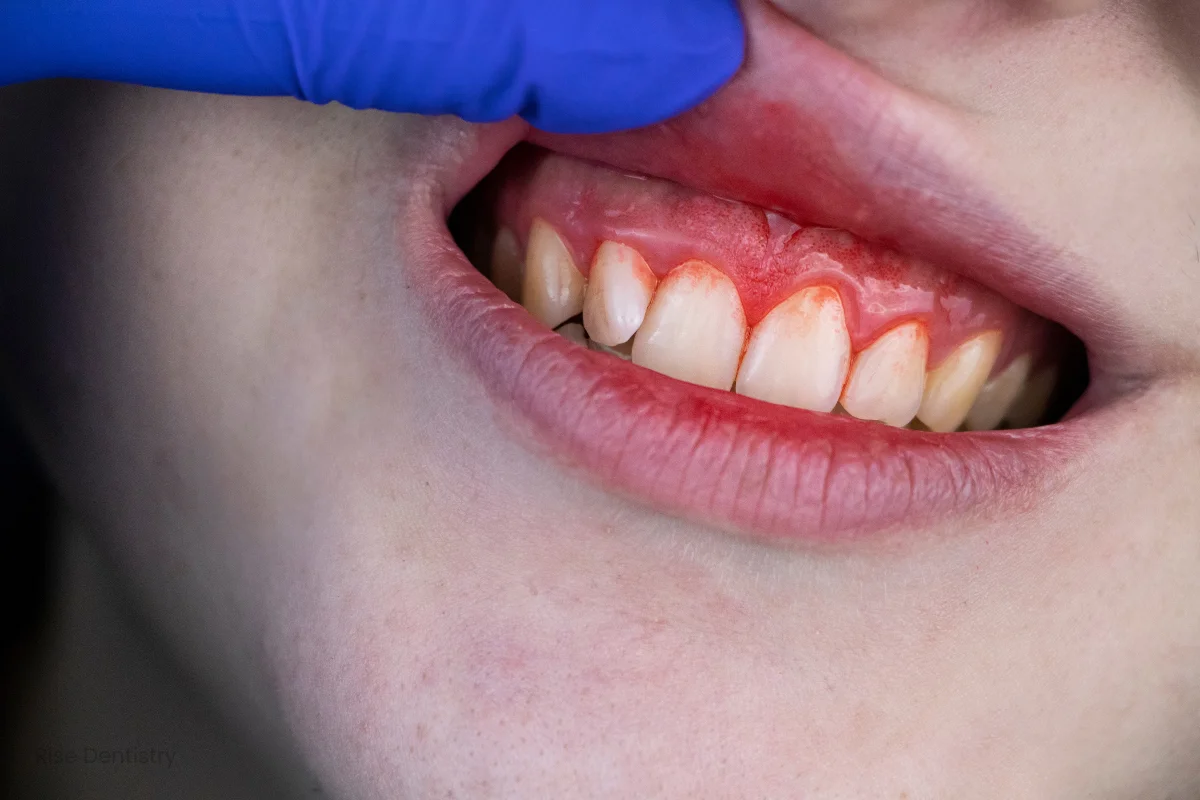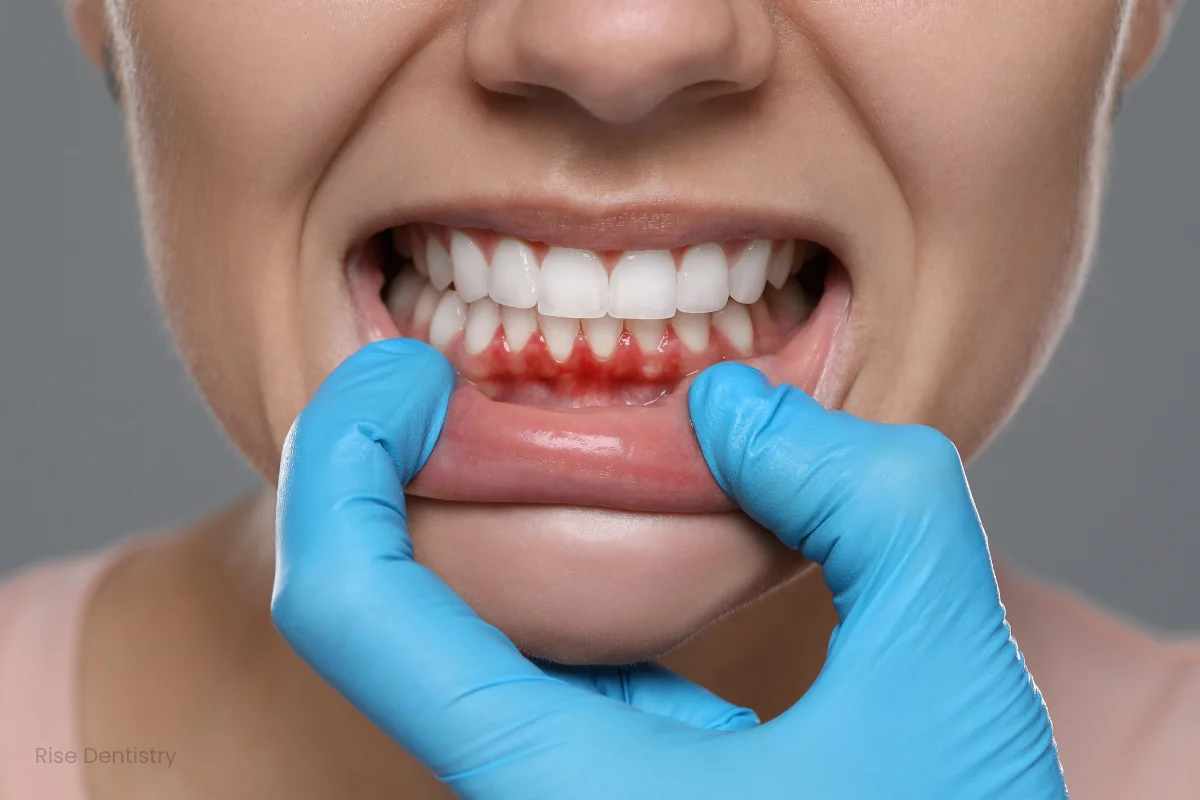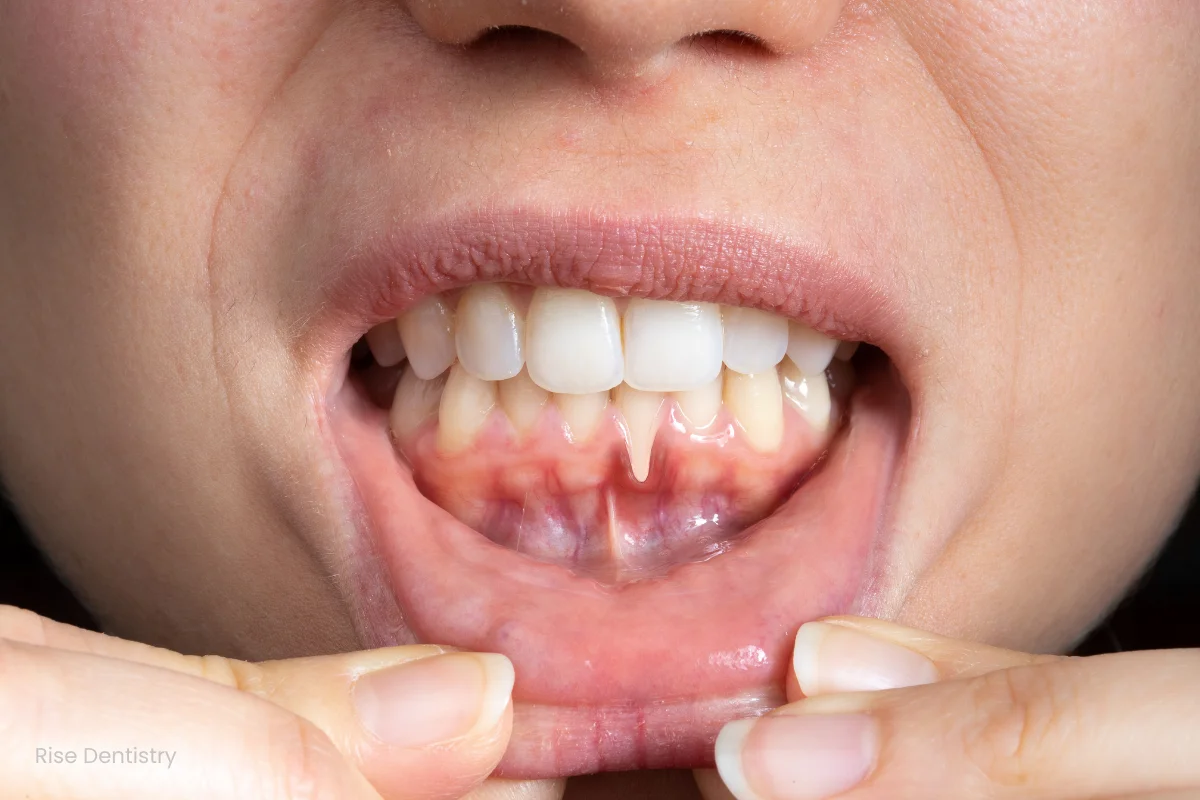
Learn effective tips to reduce gum bleeding after a dental cleaning. Protect your oral health and maintain a healthy, confident smile today!
It can be worrying to see your gums bleed after a dental cleaning. Many patients notice a small amount of blood and feel concerned. In most cases, how to stop gum bleeding after dental cleaning is straightforward, and the bleeding is normal and temporary. It often happens because plaque and tartar are removed, exposing the tender tissue of your gums.
However, if the bleeding lasts more than a couple of days, it may signal a more serious issue. Persistent bleeding could indicate gum inflammation or early signs of gum disease. At Rise Dentistry, we help patients understand what’s normal and provide guidance to keep gums healthy and strong.


Bleeding gums when cleaning teeth is common after a professional cleaning. Plaque and tartar buildup can irritate the gums and cause bleeding. Early gum disease, like gingivitis, often makes the gums inflamed and tender. Some people naturally have sensitive gums that react more during cleaning. Gum irritation can also happen if teeth have not been cleaned regularly.
Even with gentle brushing, you may notice teeth bleeding after cleaning. Certain medications, like blood thinners, can increase bleeding risks, and medical conditions affecting the immune system may also make gums more prone to bleeding. Understanding these factors helps you know when mild bleeding is normal and when to seek help.
Early gum disease, known as gingivitis, often causes gums bleeding after dentist cleaning. Inflamed gums are tender and may bleed easily during a dental cleaning. This bleeding is a sign that plaque and bacteria have irritated your gums over time. Treating gingivitis early can help prevent more serious gum problems.
Using the wrong flossing or brushing method can injure your gums. Improper Flossing may cut or irritate gum tissue, causing bleeding during or after cleaning. Learning proper hygiene techniques is essential to prevent ongoing gum irritation and bleeding. Gentle, correct brushing and flossing can help keep your gums healthy.
Some people have naturally sensitive gums, which can react strongly to cleaning. Exposed roots or receding gums make teeth more prone to bleeding. Even with careful cleaning, these areas may still bleed because the tissue is delicate. Understanding your gum sensitivity can help you take extra care at home.
Certain medications, like blood thinners, can make your gums more likely to bleed. Health issues such as diabetes or chronic stress may also worsen gums bleeding after dentist cleaning. Being aware of these factors allows your dentist to provide personalized advice and safer cleaning approaches.
Rinsing your mouth with salt water can help reduce gum irritation and promote faster healing. Mix a teaspoon of salt in a glass of warm water and swish gently. Doing this once or twice a day can calm inflamed gums and prevent infection.
Brushing with a soft-bristled toothbrush helps avoid further injury to tender gums. This technique protects sensitive tissue while keeping your teeth clean.
Proper flossing removes plaque and prevents bleeding from returning. Use a C-shape motion around each tooth and gently slide between gums. Daily flossing, done correctly, strengthens your gums and reduces gum irritation over time.
Eating vitamin-rich foods helps your gums recover faster. Vitamin C from oranges or bell peppers strengthens tissue. Vitamin K and omega-3s help reduce inflammation and support good oral health. Avoid very hard, sticky, or acidic foods right after cleaning to protect sensitive gums.


Sometimes bleeding gums may signal more serious issues like advanced gingivitis or periodontitis.

Persistent gums bleeding after dental cleaning should not be ignored.

If bleeding continues for several days, schedule a Follow-Up appointment.

Other warning signs include swelling, pus, or loose teeth.

These symptoms may indicate infection or gum disease progression.

Seeing a dentist or periodontist promptly helps prevent further damage and protects your teeth.

Early treatment can stop problems from getting worse and restore healthier gums.

Ignoring these signs may lead to tooth bleed or more extensive procedures late.


Preventing gum bleeding starts with daily plaque control and proper brushing. Regular dental cleaning helps keep gums healthy and reduces inflammation. Good oral habits, like brushing twice a day and flossing correctly, lower the risk of bleeding gums after dental cleaning.
Lifestyle changes also play an important role. Quitting smoking, staying hydrated, and managing stress can improve overall gum health. For extra support, Rise Dentistry offers professional Bleeding Gums Treatment to strengthen gums and prevent future bleeding. Combining home care with professional guidance ensures your gums stay healthy and comfortable.

Bleeding gums after a dental cleaning is common, but understanding the causes can help you manage and prevent it. Mild bleeding often resolves on its own, but persistent bleeding may signal underlying gum issues. Maintaining proper brushing and flossing techniques, rinsing with Salt Water, and choosing nutrient-rich foods all support healthier gums.
Knowing how to stop gum bleeding after dental cleaning and practicing consistent oral care can prevent complications like gum disease or tooth loss. Regular dental cleaning and check-ups are essential for keeping your gums strong and maintaining a healthy, confident smile.
Mild bleeding usually stops within 1–2 days. If it continues longer, it may signal gum inflammation or irritation. Scheduling a check-up with your dentist can help ensure proper healing and prevent further problems.
Yes, some bleeding is normal, especially if gums are inflamed, sensitive, or haven’t been cleaned regularly. This is your body’s natural response to plaque and tartar removal and usually resolves quickly.
Rinsing gently with salt water helps reduce inflammation and promote healing. Brushing with a soft-bristled toothbrush and avoiding aggressive flossing can also stop bleeding faster.
Yes, a warm Salt Water rinse can calm irritated gums, reduce swelling, and help tissue heal naturally. Swish gently for 30 seconds, and repeat a few times a day as needed for comfort.
Common causes include gingivitis, plaque buildup, sensitive gums, or improper flossing. Certain medications or health conditions may also make your gums more prone to bleeding. Understanding the cause helps your dentist provide the right treatment and advice for healthier gums.


Keeping your gums healthy starts with regular visits to Rise Dentistry. Our team can guide you on how to stop gum bleeding after dental cleaning while providing thorough Dental Cleaning services. Early check-ups help catch issues like plaque buildup or gingivitis before they become serious.
If you’ve noticed bleeding gums after deep cleaning, don’t wait for it to worsen. Schedule an appointment at Rise Dentistry in Magnolia, TX today for personalized care and professional advice to protect your gums and smile.
EXCELLENTTrustindex verifies that the original source of the review is Google. "For years, I avoided the dentist due to my anxiety. Dr. Hassan sorathia and their team completely changed my perspective. The office has such a calming atmosphere, and the staff is compassionate and understanding. They explained every step of my treatment and made sure I was comfortable. I'm so grateful I found them and can now take care of my teeth without fear."Posted onTrustindex verifies that the original source of the review is Google. Rise was amazing! They extracted a wisdom tooth from me and the experience was completely pain free. Thank you so much!Posted onTrustindex verifies that the original source of the review is Google. I’m so grateful I found Dr. Sorathia and his wonderful staff at Rise Dentistry! From the moment I called, his office was incredibly accommodating and got me in immediately. He was professional, kind, and patient, and he truly understood my dental anxiety. I never felt rushed or pressured and he welcomed all my questions and explained each step of the process so I always knew what was happening. He made sure I understood all of my options, allowing me to make the most informed decision for my care. I left feeling comfortable, informed, and confident about my treatment. I will absolutely be returning to Dr. Sorathia and highly recommend him to anyone looking for a compassionate and thorough dentist.Posted onTrustindex verifies that the original source of the review is Google. I’m so glad I found this office! Staff is so kind and professional. They keep your comfort at the top of their priority list. Wish I had found them sooner! Can’t recommend this dentist enough!Posted onTrustindex verifies that the original source of the review is Google. Excellent Staff and Dr Sorathia very knowledgeable pleasant ambiance !Posted onTrustindex verifies that the original source of the review is Google. Had a great experience, no wait time, in and out. Everyone was friendly, informative and professional.Posted onTrustindex verifies that the original source of the review is Google. So refreshing to meet an HONEST dentist who isn’t trying to upsell you anything. Just tells you the facts doesn’t try to sway your opinion, just lays out the options based on facts and allows you to choose for yourself what works best for you. I definitely highly recommend!Posted onTrustindex verifies that the original source of the review is Google. Fantastic service! Had a bad tooth that was absolutely killing me for several days. I load going to the dentist so I don’t have a normal one. Set the appointment in the morning and got in that same day. The dentist explained saving versus extracting the tooth and 35 minutes later I was going home. He was extremely thorough and telling me what he was going to do and with the post office instructions. The staff both out front and his assistants were fantastic!! absolutely could not have asked for a better experience and he will be my dentist going forward.
© 2023-2025 Rise Dentistry. All rights reserved.